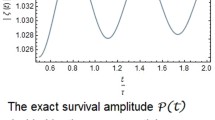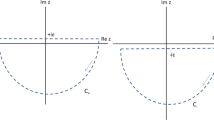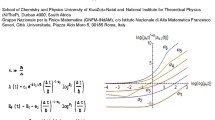Summary
Two apparent paradoxes in the quantum theory of unstable systems are discussed and dissolved. According to one of them all decay processes, regardless of their mechanism, would be exponential under certain very general assumptions. Acoording to the other an unstable system will never decay, provided it is kept under constant observation. The paradoxes are shown to derive from the tacit classical assumption that every unstable thing is always either in the undecayed or in the decayed state. They do not occur as long as the superposition principle is taken seriously and the system is conceived as being normally in a superposition of sharp states. Moreover, the decay is shown to be a continuous process that unfolds regardless of the observations to which the decay products may be subjected.
Riassunto
Si discutono e risolvono due apparenti paradossi nella teoria quantistica di sistemi instabili. Secondo uno di questi, tutti i processi di decadimento, indipendentemente dal loro meccanismo, sarebbero esponenziali secondo certe ipotesi molto generali. Secondo l'altro, un sistema instabile non decaderà mai, ammesso che sia mantenuto sotto costante osservazione. Si mostra che i paradossi derivano dal sottinteso presupposto classico che ogni cosa instabile sia sempre sia nello stato non decaduto che in quello decaduto. Questi non si verificano fino a che il principio di sovrapposizione, è preso seriamente e il sistema è considerato essere normalmente in una sovrapposizione di stati definiti. Inoltre si mostra che il decadimento è un processo continuo che si svolge indipendentemente dalle osservazioni alle quali i prodotti di decadimento possono essere soggette.
Резюме
Обсуждаются и разрешаются два кажущихся парадокса в квантовой теории нестабильных систем. Согласно одному из них, все процессы распада, независимо от их механизма, будут экспоненциальными некоторых очень общих предположениях. Согласно другому, нестабильная система никогда не распадется, при условии, что она находится под постоянным наблюдением. Показывается, что парадоксы возникают из-за неявного классического допущения, что каждый нестабильный оббект всегда находится либо в нераспавшемся, либо в распавшемся состояних. Парадоксы не возникают, пока пока имеет место принцип суперпозиции и система представляется, как суперпозиция резких состояний. Более того, показано, что распад является непрерывным процессом, который развертывается независимо от наблюдения, которое может воздействовать на продукты распада.
Similar content being viewed by others
References
L. Fonda, G. C. Ghirardi andA. Rimini:Rep. Prog. Phys.,41, 587 (1978).
B. Misra andE. C. G. Sudarshan:J. Math. Phys. (N.Y),18, 756 (1977).
C. B. Chiu, E. C. G. Sudarshan andB. Misra:Phys. Rev. D,16, 520 (1977).
A. Peres:Am. J. Phys.,48, 931 (1980).
H. Ekstein andA. J. F. Siegert:Ann. Phys. (N. Y.),68, 509 (1971).
A. Degasperis, L. Fonda andG. C. Ghirardi:Nuovo Cimento A,21, 471 (1974).
This point will be taken up in the following paper by the same authors,Nuovo Cimento B,77, 10 (1983).
W. Feller:An Introduction to Probability Theory and Its Applications, Vol.1, 3rd edition (New York, N. Y., 1968).
W. Yourgrau inI. Lakatos andA. Musgrave, Editors:Problems in the Philosophy of Science (Amsterdam, 1968), p. 191.
M. v. Smoluchowski:Naturwissenschaften,6, 253 (1918).
M. Fréchet:Les mathématiques et le concret (Paris, 1946), p. 157.
M. Bunge:Br. J. Philos. Sci.,6, 1, 141 (1955).
M. Bunge:Am. J. Phys.,24, 272 (1956).
K. R. Popper:Observation and Interpretation, edited byS. Körner (London, 1957).
M. Bunge:Appl. Math. Model.,5, 306 (1981).
N. Bohr:Atomic Theory and the Description of Nature (Cambridge, 1934).
M. Bunge:Foundations of Physics (New York, N. Y., 1967).
P. A. M. Dirac:The Physicist's Conception of Nature, edited byJ. Mehra (Dordrecht, 1973), p. 1.
M. Cini:Nuovo Cimento B,73, 27 (1983)
Author information
Authors and Affiliations
Additional information
Traduzione a cura della Redazione.
Переведено редакцией.
Rights and permissions
About this article
Cite this article
Bunge, M., Kálnay, A.J. Solution to two paradoxes in the quantum theory of unstable systems. Nuov Cim B 77, 1–9 (1983). https://doi.org/10.1007/BF02738413
Received:
Revised:
Published:
Issue Date:
DOI: https://doi.org/10.1007/BF02738413




